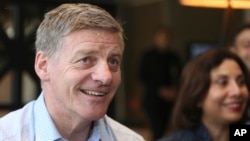New Zealanders went to the polls Saturday after the most hotly contested race in recent history, with changes to the country’s openness to migration and trade and the central bank’s approach to monetary policy among the possible outcomes.
The ruling National Party and opposition Labour Party had been neck-and-neck in opinion polls and will likely have to rely on minor parties to form a coalition in New Zealand’s German-style proportional representation voting system.
A record 1.2 million votes were cast in advance, but neither major party was expected to win an outright majority. Negotiations with minor parties mean it could be weeks before a new government emerges.
In early returns, the ruling National Party reached 46.3 percent with 31.4 percent of results counted, while support for the opposition Labour Party was 36 percent, according to the Electoral Commission.
“This has been an incredibly engaging and colorful campaign for New Zealanders and that isn’t going to be over at midnight,” said Bryce Edwards, an analyst at Wellington-based Critical Politics.
“The most likely scenario is we are going to have to wait two weeks when the final verdict is in from the Electoral Commission because it is just going to be so close,” he said.
Jacinda Ardern, the charismatic 37-year-old who only became Labour Party leader in August, is vying to become New Zealand’s third female prime minister and the youngest in modern history.
Prime Minister Bill English, who oversaw a disastrous election loss for the National Party in 2002, became leader last year after his predecessor John Key’s shock resignation. His party has held power for almost a decade.
English and Ardern were expected to maintain fiscal prudence but will probably differ on monetary policy, trade and immigration. That will likely have implications for the New Zealand dollar, the world’s 11th most-traded currency in 2016.
Ardern wants to add employment to the central bank’s inflation-targeting mandate, which could mean more stimulatory monetary policy. She also wants to cut migration and renegotiate some trade deals, which some worry could hurt two key sources of growth for New Zealand’s small, outward-looking economy.
Ardern has called on New Zealanders to ditch “auto-pilot” governance, hoping to ride a global wave of change that most recently propelled France’s Emmanuel Macron to become its youngest head of state since Napoleon.
She turned her flagging party’s fortunes around in a matter of weeks but National, which has pinned its re-election bid on the economy’s strong performance, has regained ground in recent opinion polls.
A tight outcome could weigh on the currency on Monday, as could results that foreshadow a change in government, analysts say.


